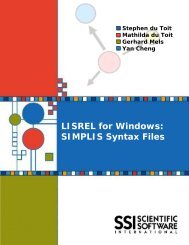结构方程模型 LISREL 8.80+LISREL 9.30试用版. 2018-01-21 20:26:19 来源: Scientific Software International 分类: Windows. 在过去的38年内, LISREL 模型,方法和软件已经变成结构方程模型 (SEM)的代名词。. Jul 04, 2021 LISREL is developed by Scientific Software International, Inc. And is used by 4 users of Software Informer. The most popular version of this product among our users is 8.8. The names of program executable files are LisWin32.EXE, Icon7D809841.exe, LISWIN.EXE, liswin32.exe.1a1.exe and RunDll32.ex. Jan 27, 2017 Appealing visualizer: the LISREL STUDENT VERSION FOR MAC visualizer uses a series of colored rectangles to demonstrate how storage is used and how files within the storage are related. The strength of this web registration bypass utility is its efficiency. LISREL stands for linear structural relation. The methodology of LISREL was first developed by Karl Joreskog in 1970. LISREL is statistical software that is used for structural regression modeling. Structural equation models are the system of linear equations. Student Edition is a full version of T-FLEX Parametric CAD with few limitations. It lets you work with lighting, video, moving scenery, lasers and water jets. It is a structural design and analysis program for AEC and CAD. It provides the latest fixes to Microsoft Office 2013 32-bit & 64-bit editions.
Overview
LISREL8.80 (Student) is a Shareware software in the category Miscellaneous developed by Scientific Software International, Inc..
It was checked for updates 31 times by the users of our client application UpdateStar during the last month.
The latest version of LISREL8.80 (Student) is 8.80, released on 02/18/2008. It was initially added to our database on 10/29/2007. The most prevalent version is 8.80, which is used by 100 % of all installations.
LISREL8.80 (Student) runs on the following operating systems: Windows.
LISREL8.80 (Student) has not been rated by our users yet.
Write a review for LISREL8.80 (Student)!
| 06/30/2021 | Farbar Recovery Scan Tool 29.06.2021 |
| 07/07/2021 | K7AntiVirus Premium 16.0.0.506 |
| 07/07/2021 | K7 UltimateSecurity 16.0.0.506 |
| 07/07/2021 | K7 TotalSecurity 16.0.0.506 |
| 07/07/2021 | EverNote 10.16.7.2775 |
| 06/18/2021 | New Chrome 91.0.4472.114 update available |
| 06/17/2021 | Firefox 89.0.1 update available |
| 06/14/2021 | Chromium-based browser updates available based on Chrome 91 |
| 06/10/2021 | New Chrome 91.0.4472.102 update available |
| 06/08/2021 | Adobe updates fix vulnerabilities in After Effects, Acrobat and others |
- » downdload lisrel for student
- » lisrel 8.80 cos'è
- » liseral 8.80
- » lisrel set up
- » student 80
- » lisrel 8.80 for windows
- » nu vot
- » download lisrel 8.80
- » telecharger lisrel student
- » lisrel 8.80
Structural equations modelling (SEM) is the term used to describe the general multivariate method of conducting factor analyses, multiple linear regression analyses and path analyses. SEM can be used for testing and evaluating complex causal models in observational studies. These models may contain multiple independent, dependent and mediating variables (interactions and categorical dependent variables can be problematic depending on the software used). SEM can also be used for confirmative factor analysis. The objective of this course is to introduce the user to the many possibilities and limitations of SEM and to practice this method using real datasets. This is done with LISREL, the oldest known computer program for SEM.
Fast facts
- 6 sessions of 2 hours each
- Minimum 7, maximum 15 candidates
- 2 ECTS
- Taught once every two years
- Intended for PhD candidates of FHML, MaCSBIO, M4I and MERLN
Instructor
Dr. Nick J. Broers
DEB1, room A1.041 (Monday, Wednesday, Friday)
Uns40, room A5.737 (Tuesday, Thursday)
+31 43 388 22 74
nick.broers[at]maastrichtuniversity[dot]nl
Target group

PhD candidates who use questionnaires, factor analysis, causal modelling analysis, regression analysis and/or path analysis.
Required prior knowledge
Basic understanding of descriptive statistics and statistical testing, factor analysis, regression analysis, and SPSS skills for Windows.
Content
- Introduction to SEM and LISREL: possibilities and conditions.
- Confirmative versus explorative factor analysis.
- Causal modelling with SEM/LISREL versus regression analysis.
- Advanced models: factor and regression analysis combined, multi-sample LISREL (groups)
Duration
6 sessions of 2 hours each (2 lectures, 2 practicals, 2 tutorials, 1 final exam).
The study load amounts to 30 hours.
Method
The course consists of two modules, each with a lecture, a computer practical and a tutorial. During the lecture, theoretical aspects of the course will be explained and demonstrated using LISREL. The practical session will give participants the opportunity to practice using LISREL with simple files (free student version). In the tutorial, these topics will be discussed and participants will be able to ask questions about the class, the literature or the practical. Participants are expected to study the handouts and literature outside of class hours.
Literature
Diamantopoulos, A. & Siguaw, J.A. (2000). Introducing LISREL. A Guide for the Uninitiated. London: Sage
Various handouts provided by the tutor
Participation
The course is offered once every two years and will be organised again in the autumn of 2021, provided the minimum number of 7 participants has been reached.
Dates 2021 will be planned in autumn
0836-LISREL – Nick Broers (MIN 7 personen - MAX 15 personen)

| 00-00-2021 | 13.30-15.30 | Hoorcollege 1 | UNS60 M2.01 |
| 00-00-2021 | 11.00-13.00 | Practicum 1 | UNS50 Room 7 |
| 00-00-2021 | 16.00-18.00 | Werkcollege 1 | UNS60 M2.01 |
| 00-00-2021 | 13.30-15.30 | Hoorcollege 1 | UNS60 M2.01 |
| 00-00-2021 | 11.00-13.00 | Practicum 2 | UNS50 Room 10 |
| 00-00-2021 | 16.00-18.00 | Werkcollege 2 | UNS60 M2.01 |
| 00-00-2021 | 13.30-15.30 | Werkcollege 3 en toets | UNS50 K4.403 |
Information
PhD secretary
+31 43 388 56 13
Mondays, Tuesdays and Thursdays from 08.30 - 12.00 hrs.
aioonderwijs[at]maastrichtuniversity[dot]nl
Course fee
PhD candidates (Promovendi) of FHML, MaCSBIO, M41 and MERLN: not applicable.
Others: €400,00.
Code: 0836
Assessment:
depends on the number of participants
Min/Max PhD candidates:
minimum 7, maximum 15
ECTS:
2